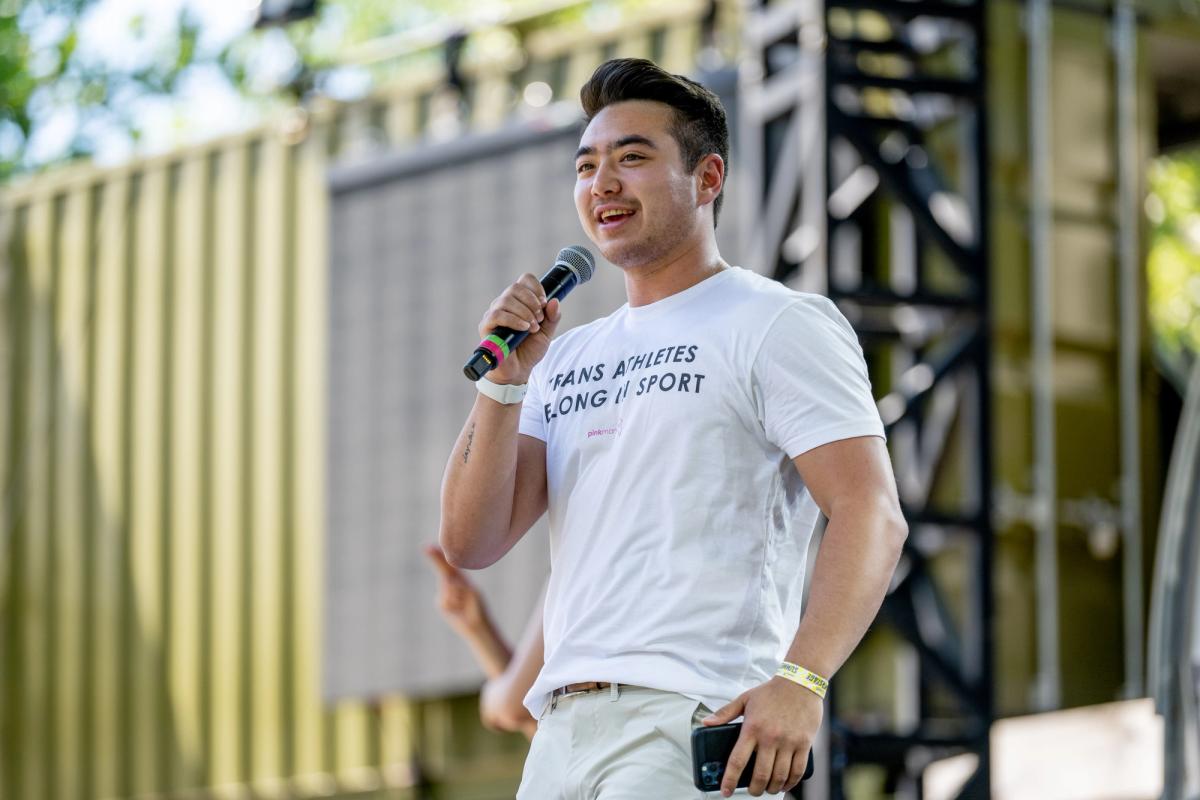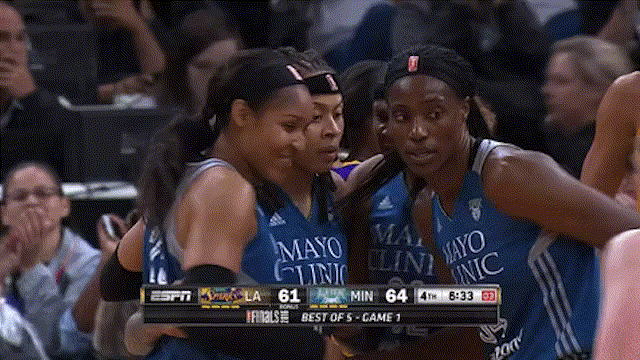A conversation with activist Schuyler Bailar

🏳️⚧️ The trailblazers
Although you wouldn’t know it from alarmist anti-trans rhetoric, trans athletes have been openly competing in the NCAA for years. Here are some of the out-and-proud folks who paved the way.
🏀 Kye Allums: A former George Washington women’s basketball guard, Allums became DI’s first openly trans athlete when he came out during his sophomore year in 2010. Post-grad, he became an activist for trans acceptance and has spoken intimately about his college experiences.
👟 CeCé Telfer: Telfer initially competed on the men’s track & field team at Franklin Pierce University. After she transitioned, in accordance with NCAA guidelines, she switched to the women’s team. In 2019, Telfer became the first trans person to win an NCAA title when she took the DII 400m hurdles crown. Today, she competes at the elite level — when she can.
🏊 Lia Thomas: Thomas’s 2022 national title in the 500-yard freestyle became a lightning rod for those debating trans athlete participation. Although her winning time was over nine seconds off Katie Ledecky’s collegiate record, Thomas was framed as a major threat to women’s swimming.
🏊 Schuyler Bailar: In 2015, Bailar was offered an opportunity to swim for either Harvard’s women’s or men’s team. In our interview, Bailar said, “When the men's coach offered me the spot…there was a bit of joy, but it was very quickly overpowered by my terror and my fear…So it took me a long time to really work through that.”
- “The pivotal moment when I decided to swim for the men's team came when I realized that I'd actually already garnered a lot of success competing in the women's category, and it hadn't brought me what I was looking for, which was my own peace, my own happiness,” he continued.
🚨 The backlash
The NCAA’s original 2011 transgender inclusion policy, which was widely regarded as fair by trans activists,was updated in January 2022 to more closely reflect the International Olympic Committee's trans athlete guidelines. The problem? These guidelines require athletes to prove, usually via hormone testing, that they don’t have a “disproportionate advantage against their peers given the nature of each sport.”
- Not only does this burden these athletes, but the new guidelines have no explicit protection against potentially invasive or harmful inspections or procedures. Decidedly not ok.
And it’s not just the NCAA where trans athletes are more and more restricted: Today, 17 states have enacted laws restricting trans college athletes from competing on teams reflecting their gender identity, and even more U.S. legislators and states have banned trans kids from authentic youth sports participation.
Why are lawmakers barring trans folks from competition? They claim it’s to protect women’s sports. But by pointing to Thomas or Telfer (the only trans women to win individual NCAA championships, BTW), they’re “tap[ping] into the good intentions of the general public,” says Bailar, “twisting the optics of feminism in order to promote transphobia and misogyny.”
- “Policing the women's [sports] category, policing women's bodies, policing anybody within femmehood…I think that's the result of the patriarchy,” he explained.
- Bailar also notes, “You can't really get two closer examples [than Thomas and myself]. We swam around the same time, in the same league, in the same sport, in the same pools. And…she had a massive amount of hatred and vitriol, and I had a percentage of it.”
📊 Facts & figures
What’s more concerning about anti-trans bans and other bigotry, says Bailar, “is the amount of misinformation that’s fueling them because it’s deeply effective to use manipulative tactics…. The lies are loud, and anti-trans rhetoric and bigotry-fueled rhetoric is very, very effective.”
So let’s squash some of this rampant misinformation. First of all, these sports-specific attacks target a minuscule fragment of the population. About 50 of the estimated 200K athletes competing in collegiate women’s sports, just 0.025%, are trans. Basically, these laws are a whole lot of bullsh!t over a handful of folks.
Myth: Trans women are going to win all the women’s championships and scholarships. Besides the fact that trans folks have been competing in the NCAA in women’s and men’s sports, whether openly or not, since at least 2010, and only two have individual ’ships, the favorite example critics point to — Lia Thomas — doesn’t hold water.
- At the 2022 NCAA championship meet, when she earned her hardware in the 500-yard freestyle, Thomas also competed in the 200-yard and 100-yard free, finishing fifth and eighth, respectively, all behind cis women.
Myth: Trans women have biological advantages over cisgender women. According to a recent review of all scientific, peer-reviewed studies into trans athletes in elite sports across an entire decade, trans women who take testosterone suppressants — a requirement in collegiate and elite sports — have no biological advantage over those assigned female at birth.
- Bailar also points out that cis athletes with distinct biological advantages, *cough, Michael Phelps,* are celebrated for those differences — if they’re male.
- “Differences that exist in the women's category, people are much more likely to call them unfair and grounds for disqualification, especially if the woman is Black or brown and/or trans,” Bailar points out. GOATs like Serena Williams and Simone Biles have been called out for this exact kind of misogynoir.
Myth: Trans men cannot adequately compete against those born male. Bailar himself is a living example refuting this point. While, like most freshmen, he did not dominate competitions in his first year, by his final season, Bailar ranked above 85% of the NCAA’s men in the 100-yard breaststroke and in the top 13% in the 100-yard fly. Smashing every expectation.
- And to those who attribute his success solely to testosterone, Bailar says, “I was also really happy for the first time in my life…that also has a deep impact on my performance…. Mental health has a huge impact on sports, but we need to make sure we're considering that when we're talking about trans athletes specifically.”
⏭️ What’s next
Activists and progressive lawmakers are fighting for protections amidst the flood of anti-trans bills. In April, President Joe Biden’s Department of Education proposed a massive Title IX change that could overrule states by prohibiting a blanket ban on trans athletes participating in sports consistent with their gender identity.
- However, the policy would allow schools to bar participation if doing so would “serve important educational objectives, such as ensuring fairness in competition or preventing sports-related injury.”
- Bailar thinks the proposed change is “in the right direction, but we need to have lots of stipulations around them to make sure that they’re used for good and not for bad…Making sure that we can’t discriminate specifically based on gender identity and transness is important because that’s a lot of what the [bans] are doing.”
So what can allies do to combat the rampant misinformation surrounding trans athletes? Bailar identifies three important things: First, in the face of propaganda and lies, “do your own critical thinking” by seeking out peer-reviewed sources, especially when “there's clear inconsistencies in the logic.”
- For example, when the messaging is “protect women, but also, let's not give a woman rights…[or] protect women’s sports, [while] 70 to 80% of the NCAA's membership is not compliant with Title IX,” that’s a clear indication that something’s amiss.
- Secondly, Bailar says, is to realize that “it’s not just about the anti-trans sports bills…these actually impact everybody” by degrading the nation’s values of “freedom and autonomy.”
Bailar’s last lesson is simple: “Maybe it also doesn’t concern you....A lot of people are very concerned with other people's genitalia. It's sports, bathrooms, gender-affirming healthcare….Stop policing other people’s bodies.” HYFR.

